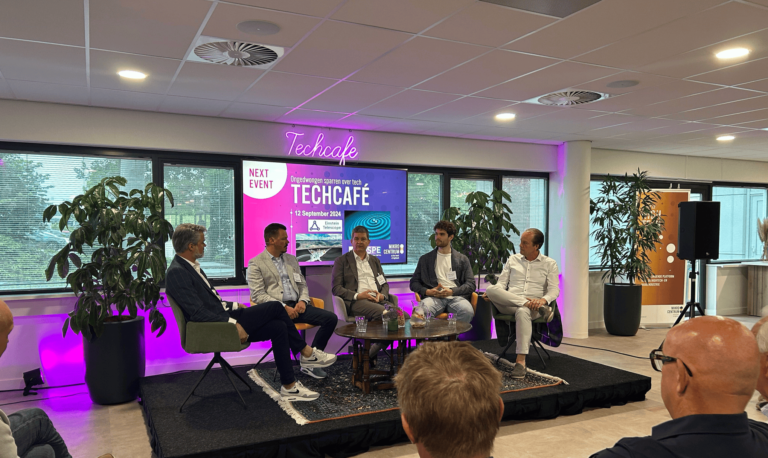At our 8th Techcafé, five experienced entrepreneurs will discuss how they transformed their tech startups into successful businesses. Paul van Dooren (Sorama), Henk Tappel (Bronkhorst), Martijn Huijbregts (iTapToo) and Patrick Geerts (MTA Group) shared their challenges and successes with host Edwin de Zeeuw (Mikrocentrum).
Why you should read this
Despite the plethora of books and pitching competitions out there, it's useful to learn from the experiences of your peers, and Techcafé fosters exactly that.
In the dynamic world of tech start-ups, the path to success is fraught with challenges and unexpected obstacles. At this Techcafé, organized by DSPE, Brainport Industries and Mikrocentrum, five prominent entrepreneurs shared their experiences and insights on how they transformed their innovative ideas into thriving businesses.
From idea to market
Paul Van Doeren of Sorama told the audience how his company started developing acoustic cameras that visualize sound. “We wanted to do something in the field of safety and security, but it wasn't immediately accepted. PSV is a good example. It wasn't until we proposed the idea that we wanted to show how excited the fans were that the commercial director bought in,” Van Doeren said. The technology is now being used at Philips Stadium, as well as in the new basketball stadium in Los Angeles. Sorama now works in both the security and entertainment fields.


New York City deploys Sorama's high-tech audio cameras to combat noise pollution
New York City is the first city in the U.S. to adopt Sorama CAM iV64 acoustic cameras to reduce noise pollution.
Henk Tappel of Bronkhorst High Tech emphasized the importance of local production and quality assurance. “At Bronkhorst, we manufacture everything locally with a local supply chain. This ensures reliable products and strong ties to the local community,” said Tappel. His experience at Philips Electron Optics and then Thermo Fisher speaks to the importance of thorough product development and customer loyalty.
Martin Huibregts, co-founder of iTapToo, explained that the company started out of students' frustration at having to buy expensive soft drinks. “Why not put tasty flavors in your own bottles? That's why we developed a system to make soft drinks from powder and water,” Huibregts told the audience. The company grew quickly, with nearly 100 machines now on the market.
Patrick Geerts, co-founder of MTA Group, revealed that many startups have no idea what it takes to make their idea a success: “Some companies think that if they throw a bunch of technologists at it and throw a bunch of money at it, they can solve a global problem with their great idea. But there's still a lot of work to be done, especially when it comes to go-to-market strategy and sales. And that's where we help.”
Elements of success
A recurring theme at the cafe was the importance of perseverance and a good team. Patrick Geerts said: “The team is very important. We look at competence and overall composition. A go-to-market strategy is essential. A lot of startups focus on the technology but forget about going to market.”
Geerts introduced the V-Square model, which supports companies from innovation to mass production. “We support companies from inception to mass production, especially entrepreneurs who tackle social issues through automation and robotics,” Geerts explained.

First Techcafé focuses on robotics for small businesses: “Just get started”
The first edition of Techcafé, which focused on robotization, immediately piqued everyone's interest.
Student Team
All participants agreed on the importance of student teams, as they are not only where many new ideas are born, but also where the foundations of future leadership are laid. Goertz praised the students for taking a year off from their studies and working with students from different disciplines to achieve their goals. “They all join our ecosystem after they finish their studies. They're not just starting their own companies, they're working for slightly larger companies. They're playing their part in the innovation roadmap.”
Build, measure, learn
An eternal cycle Build, measure, learnThe “iterative approach” that often appears in every startup playbook has proven to be valuable even today. It has its drawbacks, but the conclusion was: “An iterative approach and testing with customers is risky. If you go to market too early, you might lose customers. On the other hand, you get a lot of valuable feedback.” The dilemma is clear, but so far the principle has not been questioned.
Huibregts added that testing new products in real-world environments is important but also carries risks: “Things may work well in the factory, but not necessarily at the customer's site. It's essential to have the courage to test and learn from failure,” Huibregts said.
The path to success is rarely without obstacles. Tappel emphasized that in large companies, internal resistance is often a challenge. “You need visionary top management that removes obstacles for the team.”
The next Techcafé will take place on September 12, 2024, and the theme will be Einstein's Telescope. Register here.



